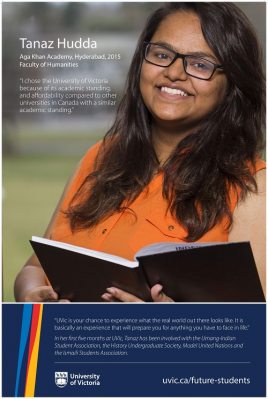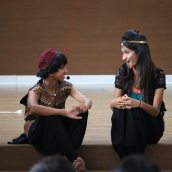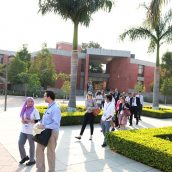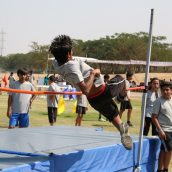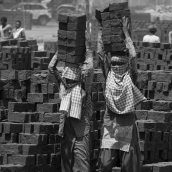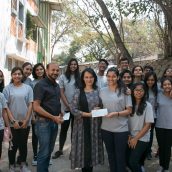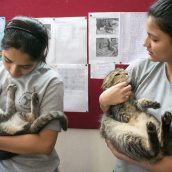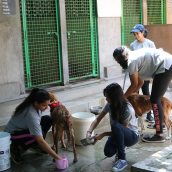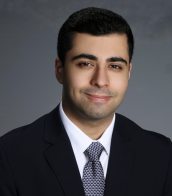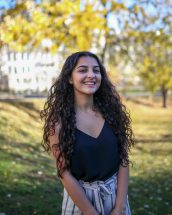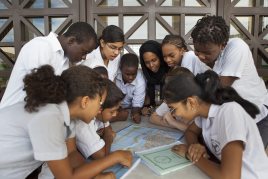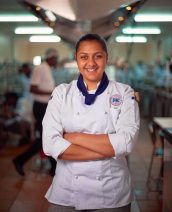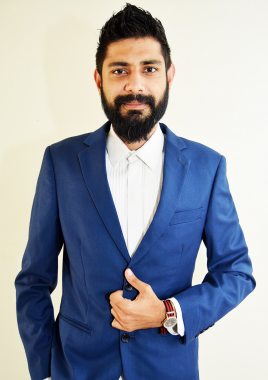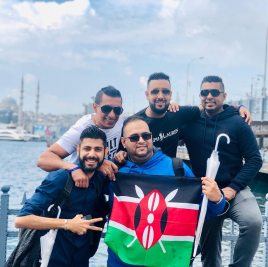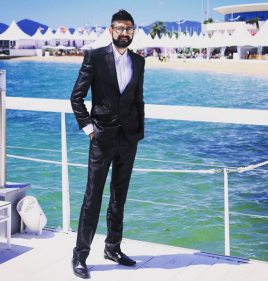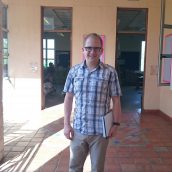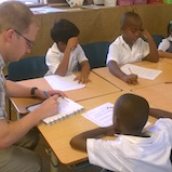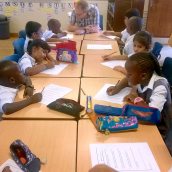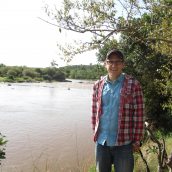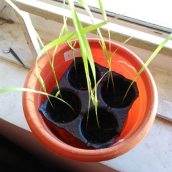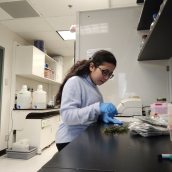At the Aga Khan Academy Mombasa, Ham Serunjogi – CEO and co-founder of African fintech giant Chipper Cash – realised the importance of staying connected to something larger than himself. The Forbes 30 Under 30 honouree is now serving as an advisor to the US President on African diaspora engagement.
Tanaz Hudda (Class of 2016): Poster girl for University of Victoria
Another lesson that is helping her through university came from one of her Academy teachers. "My teachers were my support system throughout my time at the Academy. One of my favourite teachers who pushed me harder and harder whenever I would perform well or sometimes not so well was Dr. Karuna Arya. I think she instilled this idea in me that one can always do better, even if it appears that you are the best at it. I genuinely cannot forget that lesson as it has helped me so much in the past few months at university." Tanaz also relied on the Academy's staff for help with university choices. "Choosing the kind of university that would suit you the best is always difficult. I had many questions and I had no clue where I would rather go as all universities seemed appealing. For me, the two things that mattered most was affordability and coop opportunities in the field of humanities. I was able to narrow down the list with the help of our University Counsellor, Ms. Pragati, and that made a huge impact on my university choice."
Even though Tanaz has found that Canada can offer her the best career opportunities she believes that giving back to her country and settling down in India is more important. "That connection is what motivates me to study harder and then settle in India to contribute to the greater good of the place I come from. The Academy taught me to strive for excellence, work for the community and be involved in as many extra-curricular activities as possible, as well as never forget where you come from. Giving back to the society has been my goal ever since I joined the Academy and would definitely influence my plans for the future." While at the Academy Tanaz volunteered at a local residential school and helped organise different events for the children there. This and other service projects, such as her volunteering in Nairobi, has convinced Tanaz of the importance of education for India's future, especially in rural schools.
Not only is it important for students to have an education but she also stresses the importance of a 'proper' education. "I have visited many local schools which have neither resources nor adequate training to teach kids what they are supposed to learn. I feel that education is the only chance we have to transform how the nation thinks and that needs to be instilled in rural areas, because India lives in its villages. No education and most of all, improper education could be dangerous in creating false knowledge and sometimes continuing the social evils that exist in a society. Hence, I would focus on making the education system better."
Nabil Patel: photographer par excellence and published author
Shaivya Arya: Striving for animal rights
Animal welfare organisation Blue Cross of Hyderabad provides ceaseless support to animals in the city by improving their living conditions, and changing people’s mindset about animal rights. Academy students volunteer regularly at the Blue Cross as part of their CAS activities. Student volunteers walk and groom dogs, assist the shelter’s administration staff and run introductory sessions for new volunteers. Shaivya’s activities were centered around the dogs of the blind and disabled ward. She learnt about dealing with cases of dog bites and interpreting dog behaviour. During her time at the shelter, Shaivya also attended a session by Blue Cross of Hyderabad co-founder, Amala Akkineni.
In her time as volunteer, Shaivya found herself in situations beyond her ken but felt pleasantly rewarded when she worked through them. “Gradually, I learnt how to handle unfamiliar situations without anyone's assistance,” she says. “The work experience serves as a method to identify our strengths and weaknesses.” Shaivya says that working at the Blue Cross has improved her communication, organization and time management skills.
Shaivya is passionate about animal rights advocacy. Before her stint at Blue Cross, she conducted surveys for her personal project, ‘Ethical Treatment Toward Animals,’ to better gauge the issue of animal abuse. “What we do not realise is that activities such as visiting the circus, the zoo or even purchasing a certain product can contribute to animal abuse,” she said. Shaivya went on to lead a successful fundraiser for the Blue Cross at the Academy’s parent teacher meeting in January 2018, raising ₹34,000. The money went toward vaccination programs for strays in the city.
Shaivya’s group members at Blue Cross constantly supported her. She credits them with helping her through tough situations and reflects on how they grew together. According to her, the team’s diversity directly impacted the work they did at the shelter. Dogs would run away from baths or refuse to be groomed and Shaivya notes that that could have been frustrating if it wasn’t for her friends alongside her.
“Each one of us has the power to make a change,” says Shaivya. “To save an innocent creature’s life, to help animals. It is time we make this a better world for us, for them, for all.”
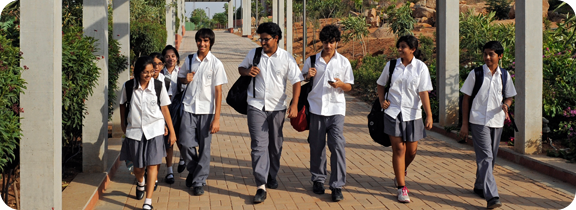
The vision for Aga Khan Academy graduates
Students at an Academy pursue a well-balanced education combining intellectual inquiry, academic excellence, sporting and cultural activities, and a grounding in ethics and moral reasoning.
They are committed to rigour and self-discipline in their studies and subscribe to the principles of intellectual honesty in the preparation of their work.
They respect their teachers and fellow students. They extend their respect to the cultural, religious and political convictions of others in school and in society. They dedicate themselves to debate issues honestly and fairly. They aim to understand and recognise the value of other views even as they value their own.
They are self-aware and socially conscious. They are committed to the development of their communities, their nation and civil society in the world at large. They are motivated to help others less fortunate than themselves.
They strive to acquire knowledge as part of a balanced, lifelong process of inquiry that leads to intellectual and personal growth, as well as a means to fulfil material goals.
The mastery of a particular discipline is balanced by a broad knowledge of several subjects, including science, art, literature and music.
They are also citizens of the world and at ease in environments and settings other than their own. They are generous and tolerant towards other cultures and traditions.
They are bilingual or multilingual.
They embrace the rich diversity of the world while valuing their own identity.
Interested to know more about our graduates? See spotlights on our alumni
Hussein Jiva (Class of 2009): A citizen of the world
Hussein Jiva graduated from the Aga Khan Academy Mombasa in 2009 after what he feels was a transformative journey.
If he is adamant about one thing, it is the notion that having an open mind allows for an individual’s personal and professional growth. The willingness to consider new ideas and listen to people whose thoughts may be different from one’s own allows one to embrace new possibilities to solve societal problems.Originally a resident of Mombasa, Hussein says it was his time at the Academy that forced him to examine his old thinking and rewrite a new chapter in his life.
“I remain a proud alumnus of the Aga Khan Academy Mombasa,” he states unwaveringly. “Given that the institution has had a huge impact in shaping my formative years.” Convinced that the Academy’s International Baccalaureate (IB) curriculum played a key role in his growth and personal development, he postulates it is the rigor of the curriculum that made him the person he is today.
“The IB curriculum education provided me with a well-rounded experience, anchored by values such as diversity, ethics, pluralism, leadership and open mindedness. On a social and cultural front, the pluralistic approach to education embraced by the Academy provided a strong foundation for me to build upon. It helped me in my journey to greater cultural understanding and tolerance, as I grew to appreciate differences in people from various backgrounds.”Hussein has a Bachelor’s Degree in Journalism and is currently pursuing a Master’s Degree in Communication Studies, with a focus on Digital Media at the United States International University–Africa in Nairobi.
Ruminating about his years at the Academy, Hussein recently spoke about how the Academy places enormous importance on its public service curriculum requisite. He feels this requirement gives students a higher purpose in life a belief that they can make a difference in the communities in which the live. Hussein’s cosmopolitan citizen-of-the-world way of thinking was borne out of this requisite.
“I recall participating in creativity, activity, service projects, one of the prerequisites to graduate from the Academy. On the surface, the concept is but a mere requirement. However, the esoteric essence of the practice provides for the development of a well-rounded individual who would ultimately contribute to the betterment of society beyond the academic sphere.”
As a journalist, Hussein has covered various local and international events including the Cannes International Film Festival from 2013 to 2016, the International Indian Film Academy Awards in 2017 and 2018 and the ICC Cricket World Cup in 2015 and ICC World T20 2016. He has also reported on momentous occasions such as Pope Francis’s visit to Kenya in 2015 and the Indian Prime Minister Narendra Modi’s visit also to Kenya in 2016.In addition, for almost eight years, Hussein worked at The Asian Weekly, a publication based in Nairobi with an East African circulation. He contributed to the Weekly as a Writer, Photographer and Sub-Editor. He later led the Sports Desk, and covering sports remains his passion.
“Sports commentary has been my area of interest, with football dominating my preferences. As such, I have written on both local and international sports, for media outlets beyond Kenya. My work has been published on portals in Nigeria, the United States and the United Kingdom. I have also been on a local television football show as a guest commentator.”
Asked what he would like to see happen in societies to make them more stable and better functioning, Hussien stated,
“Let us become instruments of change and alter the realities we face; let not challenges be viewed as obstacles to success but stepping stones toward it. After all, when you change the way you look at things, the things you look at will ultimately change.”
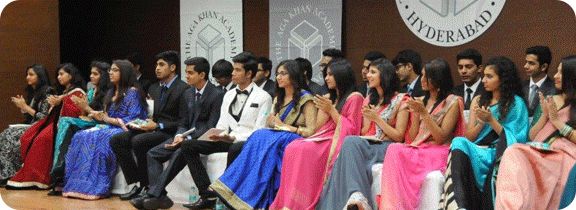
The vision for Aga Khan Academy graduates
Education at its best facilitates positive growth in all domains – intellectual, social, physical, ethical and spiritual – leading to the well-rounded development of the child. The Aga Khan Academies aim toward this ideal, and the values they espouse are reflected in each school’s aspirations for its students.
Students at an Academy pursue a well-balanced education combining intellectual inquiry, academic excellence, sporting and cultural activities, and a grounding in ethics and moral reasoning
They are committed to rigour and self-discipline in their studies and subscribe to the principles of intellectual honesty in the preparation of their work.
They respect their teachers and fellow students. They extend their respect to the cultural, religious and political convictions of others in school and in society. They dedicate themselves to debate issues honestly and fairly. They aim to understand and recognise the value of other views even as they value their own.
They are self-aware and socially conscious. They are committed to the development of their communities, their nation and civil society in the world at large. They are motivated to help others less fortunate than themselves.
They strive to acquire knowledge as part of a balanced, lifelong process of inquiry that leads to intellectual and personal growth, as well as a means to fulfil material goals.
The mastery of a particular discipline is balanced by a broad knowledge of several subjects, including science, art, literature and music.
They are also citizens of the world and at ease in environments and settings other than their own. They are generous and tolerant towards other cultures and traditions.
They are bilingual or multilingual.
They embrace the rich diversity of the world while valuing their own identity.
Read more here.
Interested to know more about our graduates? See spotlights on our alumni
Sharing practice across oceans
Andrew Jones is a teacher from Ontario, Canada who has spent the past year at the Aga Khan Academy Mombasa, working with the Junior School as part of a teacher secondment partnership between the Aga Khan Academies and the Province of Ontario.
On first arriving at the Academy Andrew said, “I [am] expecting an enriching experience that will allow me to learn about another culture by being immersed in it. I expect to grow as an educator because different settings, both culturally and through the [International Baccalaureate] programme, will allow me to expand my skill set as to how best practices support student learning.” One year later, he reflects on his experience.
Almost two years ago now, I was reading the book, Everyone Can Learn to Ride a Bicycle, by Chris Raschka to my new grade one class in Kitchener, Ontario, Canada. This book helps me encourage my students at the start of the year to continue developing resiliency through adopting a growth mindset by trying new things, taking risks and reflecting on both successes and mistakes. Little did I know, I was not just teaching my students this skill, but I was also going to follow this advice myself.
Ever since I began teaching almost 10 years ago, many changes in my job assignment have sparked a passion for professional learning and development in my teaching practice. Over this year, I have immensely enjoyed this new job working for the Ministry of Education in Ontario on an educational partnership between our government and the Aga Khan Academy Mombasa. I have had the opportunity to grow and learn as both an educator and an individual through my interactions at the Academy and through daily life in Mombasa.
Working at the Aga Khan Academy Mombasa has been an immense opportunity of both professional and personal learning that I am thankful for. I ask myself this very question, “What best teaching practices am I learning about that I should share with Ontario teachers?”
Here are three that I have learned more about since being here.
Building Confident Leaders – Students build their confidence and exude enthusiasm as they try new things and take risks during their participation in a variety of classroom activities, sports galas, enrichment opportunities and Friday assemblies. Students are confident, have strong leadership skills and advocate for equity. Confidence stands out as a defining characteristic of the learners present here in the Junior School.
Promoting Pluralistic Thinking – The Junior School’s demographic is vibrant and diverse, reflective of the Mombasa community’s cultures, religions and backgrounds. Activities at the school, such as the Arts Week performance, continually emphasise appreciation and understanding toward different views and beliefs and encourage students to think pluralistically as they work together.
Dual Language Practices – I have been learning Kiswahili “pole pole” this past year, and I am quite experienced in giving directions to tuk tuks and boda bodas. As I learn a new language, it helps me think about the world in different ways and makes me more pluralistic in my thinking. Likewise, students at the Academy develop academic competency and fluency in both the national language of Kenya, Kiswahili, and the official language of Kenya, English. Additionally, learning similar concepts in two languages allows students to develop pluralistic view points as languages sometimes look at similar ideas in different ways.
I am thankful to explore Kenya’s beauty and diversity, so far from Mount Kenya to the Masai Mara to Mombasa. I continue to grow and to learn and am thankful to the kind and generous Mombasa community that has made my transition to working at the Academy warm and welcoming. I feel very privileged to be working with such a dedicated and caring staff and with phenomenal students.
By Andrew Jones
Sarah Keshvani (Class of 2018): using biology to tackle environmental challenges
Sarah’s love for the sciences flourished during the Diploma Programme (DP) at the Academy in Hyderabad. Through her extended essay, she found the opportunity to learn more about how biology can provide solutions to modern challenges faced in local communities. She decided to tackle the issue of water shortages and soil nutrient deficiencies hindering large scale rice cultivation in the state of Telangana, leading to reduced crop yields. Due to zinc deficiencies in the soil, farmers resort to using huge amounts of fertilisers, which further degrade soil quality.
Sarah’s research centred on hydroponics as a possible solution to this problem. Plants are grown in water-based, nutrient solutions instead of soil.
“This technique has recently garnered a lot of attention because experiments have shown that growth is more than doubled when compared to traditional methods of agriculture,” Sarah explained. “Nutrient uptake is more efficient, and farmers can control the type of nutrients the plant is exposed to, in order to enhance different features of the yield. The use of water in hydroponics is still much more efficient than how it is used in open paddy fields that need to be covered in water during certain times of the crop cycle.”
Sarah’s conclusions were positive. Rapid growth was observed and the flexibility to control the nutrient uptake played a huge role in optimal plant health. She realised that a closed system would have provided more accurate results, as the higher evaporation rates disturbed the pH levels. Overall though, she deduced this technique could definitely tackle the challenges faced by paddy farmers.
“The IB curriculum followed at the Academy has played a pivotal role in building many essential skills for university life,” Sarah reflected when asked how she has settled into this new phase. “The emphasis on academic integrity and independence have served me really well here. I was taught to think critically rather than blindly follow textbooks. Its skill-based learning approach, and connecting classroom learning to the real world, also prepared me well for higher education.”
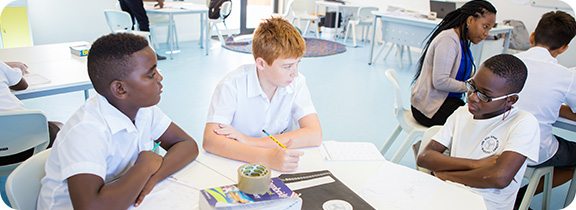
Primary Years Programme
The Aga Khan Academy Maputo has been accredited as an IB World School for the Primary Years Programme (Grades K–5).
Foundations for lifelong learning
The Primary Years Programme focuses on the development of the whole child. It is geared towards creating independent, confident and respectful learners.
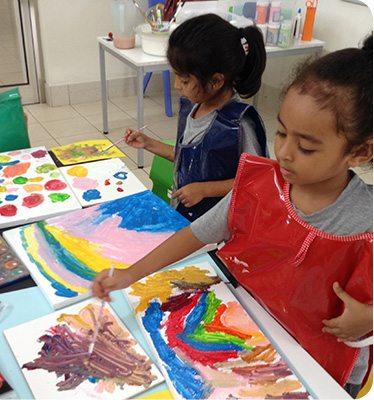 Our classroom curriculum and after-school activities address the children's social, physical, cultural and ethical development while giving them a strong foundation in all the major areas of knowledge.
Our classroom curriculum and after-school activities address the children's social, physical, cultural and ethical development while giving them a strong foundation in all the major areas of knowledge.
The curriculum consists of five essential elements:
- concepts
- knowledge
- skills
- attitude
- action.
The core subjects we cover include English language, mathematics, science and technology, and social studies. Our programme also includes a beginning computing course, physical education, music, art, French and Portuguese.
Students and teachers explore questions in all subject areas using an interactive, student-centred approach. The knowledge element of the curriculum is enhanced by six themes that are studied across the various subject disciplines. These are:
- who we are
- where we are in place and time
- how we express ourselves
- how the world works
- how we organise ourselves
- sharing the planet.
The PYP develops well-rounded students who are well versed in all areas of knowledge. They learn to be intellectually curious, principled, caring, open-minded, well balanced and reflective learners.
Please visit the Admission Requirements page or contact us to find out more about applying to the PYP at the Academy.
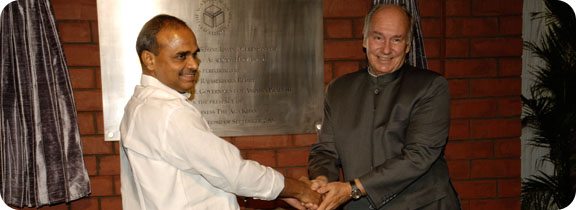
History
In 2000, His Highness the Aga Khan initiated a programme to establish an integrated network of schools, known as the Aga Khan Academies. The aim of the Academies is to provide education to deserving students at an international standard of excellence.
The Aga Khan Academies are part of the Aga Khan Development Network (AKDN), which has been involved in education in developing countries for decades. AKDN agencies currently run more than 240 schools and educational programmes ranging from early childhood through to post-graduate education.
In 2003 the first Academy was established in the Kizingo area of Mombasa, Kenya. A facility inspired by Swahili architecture, the Aga Khan Academy Mombasa is a state-of-the-art learning institution. It is recognised as an International Baccalaureate World School. The Aga Khan Academy Hyderabad was the second to open in 2011, and the third opened in 2013 in Maputo, Mozambique.
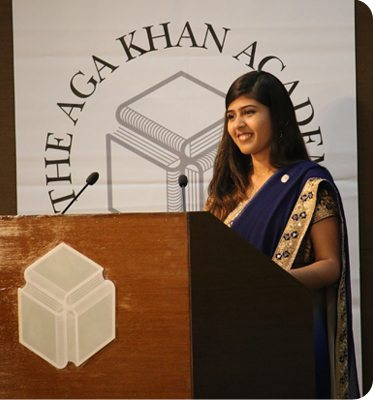 Establishment of the Aga Khan Academy Hyderabad
Establishment of the Aga Khan Academy Hyderabad
Construction of the Aga Khan Academy in Hyderabad began in 2006. The first intake of students was in August 2011 for the Junior School and 2012 for the Senior School, including the residential programme. The Academy has been accredited as an International Baccalaureate World School for the Primary Years, Middle Years and Diploma Programmes. The first class of the Senior School’s Diploma Programme graduated in 2014.
The Academy's Professional Development Centre (PDC) began operating in July 2010, prior to the opening of the school. The first programme offered by the PDC was a series on Professional Learning for Educators. These are collaborative courses designed by the Aga Khan Academies with input from government and educational experts. Their aim is to improve the education of both students and teachers within the region.
A global learning community
As further Aga Khan Academies are established, the vision is for them to become an interconnected network of schools that form a global learning community. The work of the Academies is also enhanced through partnerships with other educational institutions and the agencies of the Aga Khan Development Network.
